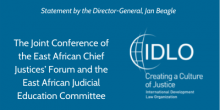Taking a survivor-centred approach to gender-based violence


Since August 2010, Kenya has been implementing a new Constitution with an expanded Bill of Rights and ambitious government decentralization (devolution) processes. The transferring of a large number of national functions to 47 newly created county governments has strengthened accountability and public service delivery at local levels. Building on notable progress achieved over a relatively short period, efforts continue to align pre-existing laws with the Constitution and to enact new laws to implement its provisions. Particular focus is being placed on legal interventions that will address issues of transparency, gender equality, peace and security, and the climate crisis.
Kenya is a Member Party of IDLO, and since 2010 the organization has collaborated with the institutions responsible for implementing the key provisions of Kenya’s Constitution, particularly relating to the Bill of Rights, land and the environment, devolution, the judiciary, access to justice and representation of the people. A key component of IDLO’s work is advancing gender justice in the country’s courts and institutions, and operationalizing the gender provisions contained in the Constitution.
IDLO also works closely with the Judiciary of Kenya, including on commercial justice reforms, such as the implementation of e-justice solutions and the establishment of Small Claims Courts, which help to streamline and speed up court processes and expand access to justice. IDLO is also providing technical support to the Sexual and Gender-Based Violence (SGBV) Court, and has helped develop policy and legal frameworks on managing and responding to SGBV.
![]() An overview of IDLO's work in Kenya
An overview of IDLO's work in Kenya


Under the second phase of the Global Regulatory and Fiscal Capacity Building Programme (RECAP II), this sub-project aims to contribute to the promotion of conducive regulatory and policy frameworks for healthy diets and physical activity for all to prevent non-communicable diseases through advocacy and multisectoral coordination in Kenya.

This sub-project sought to enhance the prevention of non-communicable diseases (NCDs) in Kenya by contributing towards an enabling environment to promote healthy diets.
CONTRACT FOR PROCUREMENT OF TRAVEL AGENT SERVICES IN KENYA
Statement by the Director-General, Jan Beagle at the Joint Conference of the East African Chief Justices’ Forum and the East African Judicial Education Committee
Honourable Chief Justices,
Members of the East African Judiciaries,
Distinguished Guests,

EVENT | 10-12 May | Kigali, Rwanda



